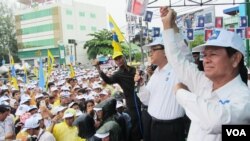PHNOM PENH - With Saturday’s opposition protest now expected to be a peaceful meditation on justice—rather than a demonstration against a flawed election process—Cambodian analysts say the current post-election deadlock may soon pass.
Opposition leaders said Monday they planned to go forward with a mass demonstration, but that they would seek to ensure it was in the tradition of peace and calm. The change came despite weeks of rhetoric that was deeply critical of July’s election process and that denied election results giving a win to the ruling party.
Kem Sokha, vice president of the opposition Cambodia National Rescue Party, told VOA Khmer the party was not “softening” its position, but it wanted to ensure public order and to avoid violence.
Analysts say a political negotiation that ends with a power-sharing agreement within the government is still possible. But it is also possible that the ruling Cambodian People’s Party will wield its influence to alter the law and allow it to form a government without the cooperation of the opposition.
Ou Virak, head of the Cambodian Center for Human Rights, said the change in the stance of Saturday’s demonstration was likely because the opposition is willing to negotiation with the ruling party.
The CPP has said it won the election with 68 of 123 National Assembly seats—figures supported by the National Election Committee. The Rescue Party says its own numbers show an opposition win with 63 seats. The opposition also says the NEC is biased toward the ruling party and responsible for widespread allegations of election irregularities.
The opposition likely wants some control within the National Assembly and some members on the NEC, Ou Virak said. And they should negotiate on how to reform the election system, rather than talk about power-sharing, he said.
Lao Mong Hay, an independent analyst, said the CPP will continue to pressure the opposition to accept the election results.
Hang Puthea, executive director of the election-monitoring group Nifec, said that historically Cambodia’s political parties dispute in this way. In the past, this has ended in conflict, he said, but it ultimately ends in compromise. Political leaders now need to think about people’s safety, he said.
Opposition leaders said Monday they planned to go forward with a mass demonstration, but that they would seek to ensure it was in the tradition of peace and calm. The change came despite weeks of rhetoric that was deeply critical of July’s election process and that denied election results giving a win to the ruling party.
Kem Sokha, vice president of the opposition Cambodia National Rescue Party, told VOA Khmer the party was not “softening” its position, but it wanted to ensure public order and to avoid violence.
Analysts say a political negotiation that ends with a power-sharing agreement within the government is still possible. But it is also possible that the ruling Cambodian People’s Party will wield its influence to alter the law and allow it to form a government without the cooperation of the opposition.
Ou Virak, head of the Cambodian Center for Human Rights, said the change in the stance of Saturday’s demonstration was likely because the opposition is willing to negotiation with the ruling party.
The CPP has said it won the election with 68 of 123 National Assembly seats—figures supported by the National Election Committee. The Rescue Party says its own numbers show an opposition win with 63 seats. The opposition also says the NEC is biased toward the ruling party and responsible for widespread allegations of election irregularities.
The opposition likely wants some control within the National Assembly and some members on the NEC, Ou Virak said. And they should negotiate on how to reform the election system, rather than talk about power-sharing, he said.
Lao Mong Hay, an independent analyst, said the CPP will continue to pressure the opposition to accept the election results.
Hang Puthea, executive director of the election-monitoring group Nifec, said that historically Cambodia’s political parties dispute in this way. In the past, this has ended in conflict, he said, but it ultimately ends in compromise. Political leaders now need to think about people’s safety, he said.







